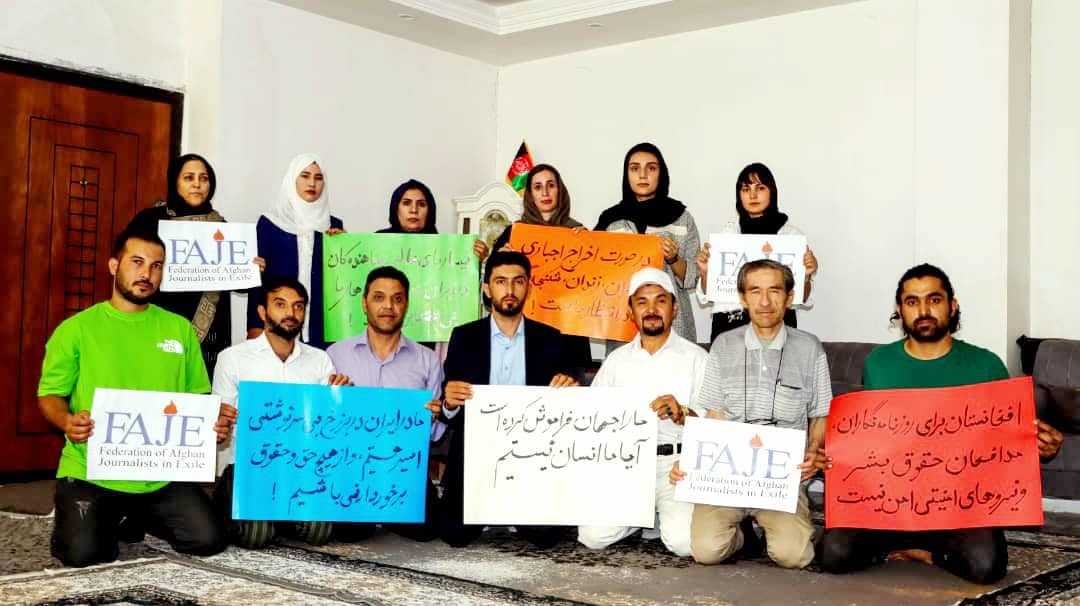Afghan Journalists in Exile Protest Forced Deportation from Iran

Amid the ongoing forced deportation of Afghan migrants and asylum seekers, members of the Federation of Afghan Journalists in Exile held a protest, demanding a halt to the expulsion of journalists, human rights defenders, former Republic security forces, and other at-risk individuals from Iran.
Following the Taliban’s return to power and due to threats, arrests, and torture by the group, hundreds of journalists, rights activists, security personnel, and vulnerable individuals fled Afghanistan, seeking refuge in Iran in hopes of resettlement in third countries.
The exiled journalists say that nearly three years into Taliban rule, the situation is worsening by the day. Afghanistan under the Taliban is no longer a safe place for journalists, human rights advocates, civil activists, or former security forces.
Mohammad Reza, a journalist and member of the Federation of Afghan Journalists in Exile, has been displaced twice. The first time was during the Soviet invasion of Afghanistan; this time, he fled the country with his family due to fear of Taliban persecution and torture and took refuge in Iran.
He says: “We left our country fearing Taliban persecution and torture. If forcibly deported from Iran, we will be sent straight into imminent and life-threatening danger.”
He added: “Those deported from Iran face serious human rights violations, including arbitrary arrests, torture, and other inhumane treatment by the Taliban.”
He also strongly criticized the UNHCR in Iran, saying: “The world has forgotten Afghan refugees in Iran, especially those at risk. We have repeatedly shared our concerns with the UNHCR, but they have failed to take any effective action to address the dire and heartbreaking conditions faced by journalists and other at-risk individuals seeking refuge in Iran.”
Banafsha Zafari, an exiled journalist, said that forced deportations of Afghan migrants have intensified over the past year. “Even those with valid residency documents are being deported. The process is accelerating, and many people have locked themselves indoors for fear of being deported. The situation is truly unbearable.”
Suwaita Gohari, a freelance journalist and human rights activist, said: “Afghan migrants in Iran face numerous issues. Various social and legal challenges have seriously affected their lives.”
She added that forced deportation is especially concerning because many fled to Iran to escape the deteriorating situation in Afghanistan. “The Iranian government deports them after their visas expire without considering the grave dangers they face. For some, returning to Afghanistan could mean being killed by the Taliban.”
Omid Pouya, head of the Federation of Afghan Journalists in Exile, said: “We are witnessing more deportations every day, which is extremely worrying.”
He added: “Some individuals, even with passports, cannot extend them more than four times. About 85% of these people face serious security threats in Afghanistan.”
As forced deportations increase, millions of Afghan migrants — including those at risk — are facing dire conditions. Journalists, lawyers, protesting women, civil society activists, human rights defenders, and former security personnel have been waiting in Iran for the past three years for their asylum cases to be processed by host countries.
At least 1.5 million undocumented Afghan migrants are currently living in Iran, facing the risk of deportation.
According to some reports, since October last year — in parallel with deportations from Pakistan — Iran has ramped up its own deportation campaign, expelling around 1.6 million Afghans for lacking legal documents. Thousands of at-risk individuals have since gone into hiding and are living under extremely difficult conditions.















